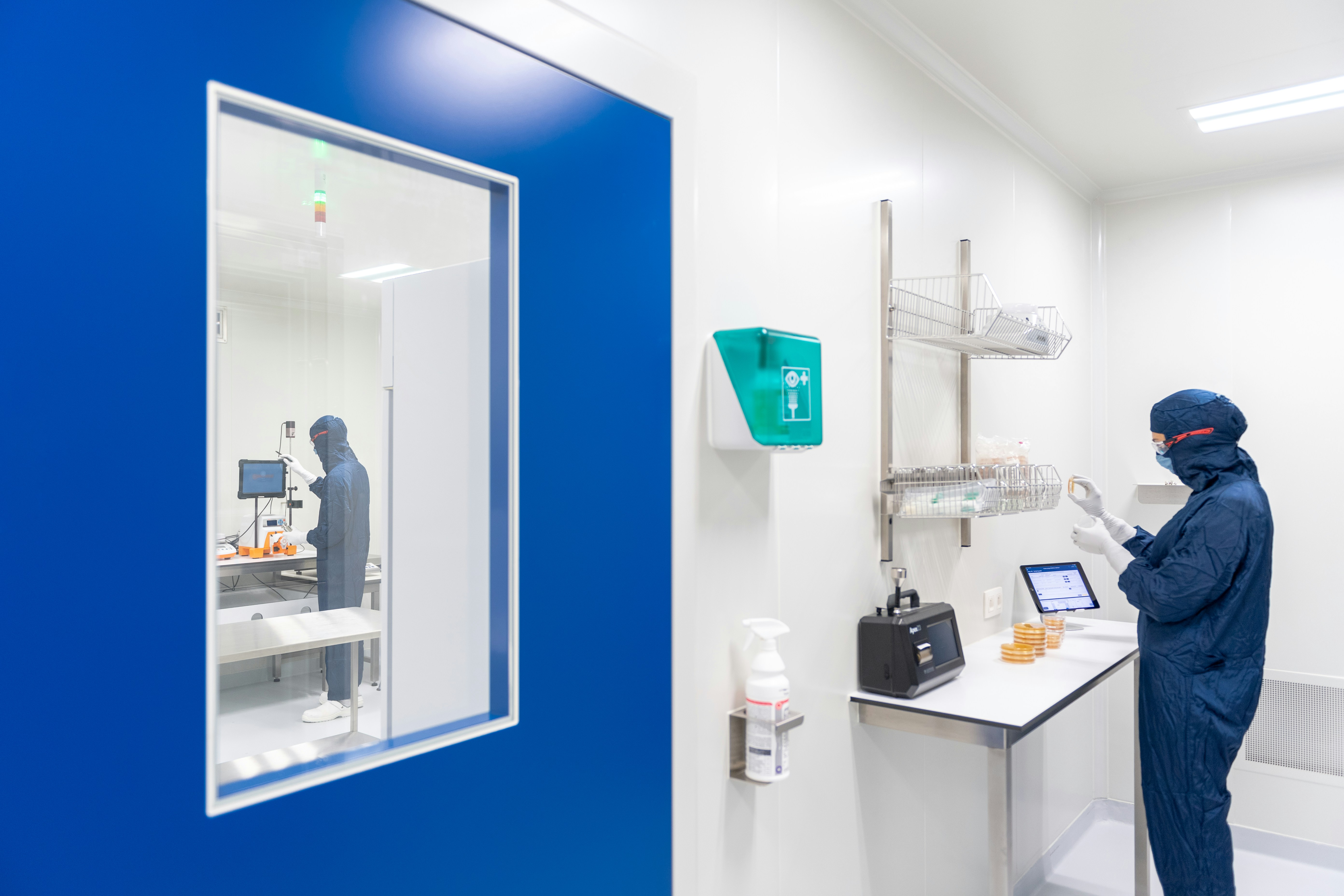In the realm of food processing, maintaining the highest standards of hygiene and safety is of paramount importance. Foodborne illnesses, contamination, and spoilage not only pose significant health risks to consumers but can also have severe financial and reputational consequences for food processing facilities.
To ensure the integrity of their products, many companies are turning to modular cleanrooms as a practical solution to meet stringent cleanliness requirements.
Modular cleanrooms are self-contained, controlled environments designed to minimize particulate contamination, control temperature and humidity, and provide optimal conditions for food processing.
There are numerous benefits that modular cleanrooms bring to food processing facilities. However, here are some key advantages that will discover why they have become indispensable assets in the quest for uncompromising cleanliness in food processing facilities.
1. Contamination Control
Even the smallest presence of contaminants, such as bacteria, allergens, or foreign particles, can compromise the safety and quality of food products. It is where modular cleanrooms play a pivotal role in maintaining a controlled environment that significantly reduces the risk of contamination.
The importance of contamination control cannot be overstated. According to the World Health Organization (WHO), nearly 1 in 10 people worldwide, approximately 600 million individuals, experience illness due to consuming contaminated food. The consequences of unsafe food extend beyond health concerns, with an economic toll of approximately US$110 billion annually.
Modular cleanrooms are designed with advanced air filtration systems, including high-efficiency particulate air (HEPA) filters, effectively removing airborne particles, dust, and microorganisms. These cleanrooms create a positive pressure environment that prevents the entry of external contaminants, ensuring that the processing area remains free from impurities.
2. Regulatory Compliance
Meeting the stringent requirements set by regulatory bodies is not only a legal obligation but also a fundamental responsibility for food processing facilities. Modular cleanrooms play a vital role in helping companies achieve and maintain regulatory compliance, as they provide controlled environments that adhere to the strict standards established by authorities.
Regulatory bodies such as the U.S. Food and Drug Administration (FDA) and the U.S. Department of Agriculture (USDA) have established comprehensive guidelines and regulations to govern food processing practices in the United States. These regulations encompass various aspects, including hygiene, sanitation, labeling, packaging, and quality control.
According to the US FDA, in the United States, over 3,000 state, local, and tribal agencies are entrusted with the crucial task of regulating the retail food and food service industries. These agencies are primarily responsible for overseeing and inspecting a vast array of food establishments, which exceed 1 million in number.
Their oversight extends to various establishments, such as restaurants, grocery stores, vending machines, cafeterias, and outlets within educational, healthcare, and correctional facilities.
One key regulation that food processing facilities must adhere to is the Current Good Manufacturing Practice (cGMP) regulations. Non-compliance with cGMP regulations can lead to severe consequences, including product recalls, penalties, and significant harm to a company’s reputation.
3. Enhanced Quality Control
Any deviation from desired standards can lead to product defects, compromised taste, or even safety hazards for consumers. Modular cleanrooms offer a valuable solution to enhance quality control measures, providing a controlled environment that minimizes variables and optimizes production conditions.
By incorporating modular cleanrooms into their operations, food processing facilities can create a standardized and controlled atmosphere that helps maintain the quality of their products. These cleanrooms are equipped with advanced monitoring systems, allowing real-time tracking of temperature, humidity, and other critical parameters that directly impact product quality.
One noteworthy innovation in modular cleanrooms is the emergence of portable cleanrooms. A portable clean room provides an efficient solution for food processing companies that require temporary or adaptable cleanroom spaces to accommodate varying production needs or facility expansions.
According to the American Cleanroom Systems, these specialized cleanroom facilities have the unique capability of being relocated without the need for disassembly. These cleanrooms come in various sizes, with smaller soft-wall cleanrooms being mounted on casters, allowing them to be easily rolled to different locations within the same factory.
Moreover, it is even possible to construct a cleanroom on a 40×8 trailer, enabling it to be towed to different sites as needed.
4. Increased Efficiency and Productivity
Modular cleanrooms contribute significantly to improving operational efficiency and productivity by creating an optimized environment that streamlines processes and minimizes disruptions.
Modular cleanrooms are designed to minimize particulate contamination, control temperature and humidity, and provide a clean and controlled workspace. By eliminating external factors that can impact production, such as dust, allergens, or temperature fluctuations, cleanrooms create an ideal environment for efficient and consistent food processing.
With enhanced cleanliness and controlled conditions, food processing facilities can experience reduced downtime due to equipment malfunctions or contamination incidents. It increases production time, allowing companies to meet demands more effectively and improve overall productivity.
5. Flexibility and Scalability
Modular cleanrooms are designed to be modular, meaning they can be easily reconfigured, expanded, or relocated as necessary. This adaptability allows food processing facilities to optimize their production layouts, accommodate new equipment, and adjust the cleanroom size to meet changing demands. Whether it’s a temporary increase in production volume or a complete facility redesign, modular cleanrooms can be modified to suit the specific requirements of the operation.
Furthermore, the scalability of modular cleanrooms enables companies to gradually scale up their production capacity without significant disruptions or expensive construction projects. As market demands increase, additional modules can be added to expand the cleanroom space and accommodate higher production volumes.
This scalable approach minimizes downtime, reduces capital expenditure, and enables food processing facilities to respond swiftly to market opportunities.
According to a report by McKinsey & Company, the ability to adapt quickly to changing consumer preferences and market dynamics is a critical factor for success. The report highlights that companies with a high level of flexibility in their operations have a competitive advantage. They can efficiently respond to market shifts and capitalize on emerging trends.
6. Cost Savings
The key areas where modular cleanrooms contribute to cost savings are construction and installation. Traditional cleanroom construction can be time-consuming, requiring extensive on-site construction work, often leading to production disruptions and increased labor costs.
In contrast, modular cleanrooms are pre-engineered and constructed off-site, allowing for faster installation with minimal disruption to ongoing operations. This streamlined process reduces construction time and labor expenses, resulting in cost savings for food processing facilities.
Additionally, modular cleanrooms offer flexibility in terms of size and configuration. Companies can choose the exact size and layout of the cleanroom based on their specific needs. It eliminates the need for excessive space and reduces construction and operational costs associated with maintaining unnecessary square footage.
To Wrap It Up
Modular cleanrooms have emerged as a transformative solution for food processing facilities, offering many benefits that enhance hygiene, quality control, flexibility, and cost savings. Embracing modular cleanrooms allows companies to optimize their operations, enhance productivity, protect consumer health, and position themselves as leaders in the industry.
Modular cleanrooms have revolutionized how food processing facilities operate, providing a solid foundation for uncompromising cleanliness, efficiency, and success in the dynamic and demanding food industry landscape.






